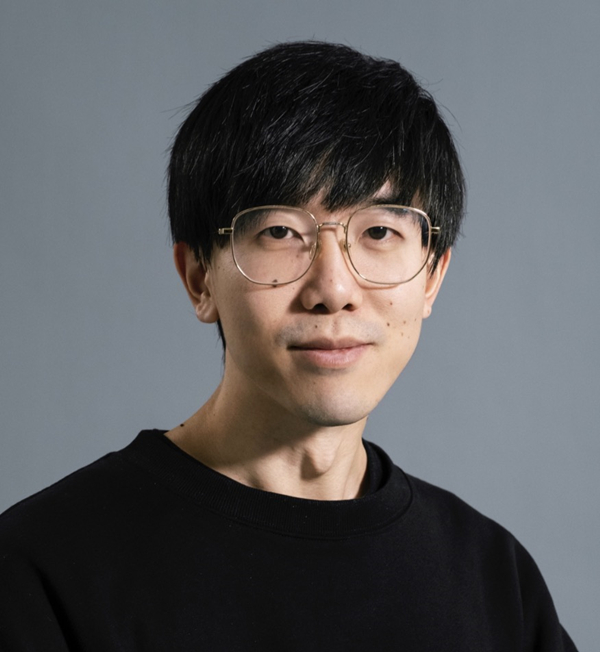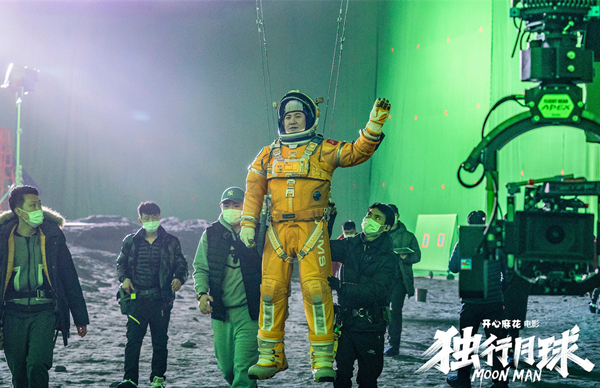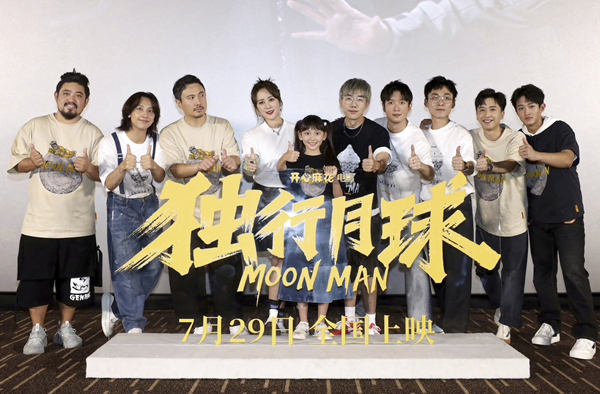'Moon Man': Off-the-wall sci-fi comedy to hook audiences
- By Zhang Rui
 0 Comment(s)
0 Comment(s) Print
Print E-mail China.org.cn, July 30, 2022
E-mail China.org.cn, July 30, 2022
"Moon Man," the sci-fi comedy film skyrocketing in the Chinese film market, is, according to its director, much more than just another comedy flick. The film is a one-man space fantasia exploring the desperation and dilemmas of a person.

"I like many scenes in the film. One of my favorites is the main character and a kangaroo sledding on the moon's surface; it has a feeling of freedom. Another is when the whole world unites on Earth to shine their lights in support of him. I like those very much. The way I see it, it is really romantic," said director Zhang Chiyu, who described himself as a newbie helming a sci-fi production for the first time.
Although the film takes place on the moon and deals with a man's struggle to survive alone, Zhang describes it as more of a comedy than a sci-fi film. "I like a story that hooks me. In the film, a lone man on the moon watches an asteroid hit the Earth, and he thinks he is the last human being in the universe, but the survivors on the Earth, including his dream lover, are watching his every move in a live cast. These scenarios are so appealing and fit our style of Mahua FunAge school! The sci-fi is the setting, but we focus on the comedy."
Mahua FunAge, founded in 2003, is a popular troupe enterprise producing comedy stage shows. After it entered the film business and created a dark horse comedy "Goodbye Mr. Loser" in 2015, Mahua FunAge attained a new level of popularity in China. Many of their later films were big blockbusters and many of their actors and directors became successful, especially actor Shen Teng and actress Ma Li, who attained unprecedented stardom and admiration.
Zhang is one such Mahua FunAge director. According to him, "Moon Man" reunites Shen and Ma, and plenty of comedy genius from the company, who often improvised random jokes on set.

"Moon Man" is expected to set some new all-time records after it hit screens on Friday through various formats including IMAX. It had raked in more than 100 million yuan in presales of tickets by Thursday noon, according to entertainment big data platform Lighthouse, the fastest and biggest presale record for China's summer film season. Chinese audiences and theaters are starving for a juggernaut film to boost the market, which has been heavily impacted in the past months due to COVID-19.
Zhang addressed the hardship the Chinese film market and industry have endured in the past months, saying, "The difficulties are always temporary, and they will pass. We will overcome."
"As a creator, I, of course, care about the box office, but I care more about word of mouth. In the past five years, we invested a lot in this film, and the best reward for us is that everyone likes it. I can't let everybody down," he added.
Critics gave the film rave reviews after the advanced screenings at its premiere on July 24.
Although the director focused on comedy, the film is a convincing sci-fi production, using technologies such as motion capture and virtual filming. The film also invited aerospace experts as consultants. The film employed 15 huge filming studios, and the crew laid 200 tons of sand and gravel in a 6,000-square-meter studio, striving to simulate lunar dust and build a lunar base in actual size. About 95% of "Moon Man" shots use special and visual effects, which were done by China's domestic visual effect companies, led by MORE VFX.

Zhang revealed the challenge of making around 1,800 special effect shots. After viewing the final products, he was in awe of how mature China's special effects were now. He was especially impressed by the space kangaroo, "King Kong Roo." He pointed out, "In the special effect industry, measuring whether a company is awesome or not is to see how well they can do a CGI creature."
King Kong Roo was the hardest challenge, and actor Hao Han played the kangaroo for motion capture. Before filming, he trained himself to be a kangaroo for seven months.
This time, the leading actor Shen Teng also faced challenges in action scenes beyond his familiar comical performance. "Shen was so supportive of me and worked hard, wanting to fulfill my vision," the director said.

Zhang said the most important message he wanted to deliver can be found at the film's end: "The universe is so big, and we can meet again."






Go to Forum >>0 Comment(s)